International Institute of Industrial Environmental Economics – Conference highlights 23-24 May 2019
23 July 2019, Hélène Robert & Mel Phadtare, Category: All insights, News, Tags: cleantechnology, climate finance, Conference, Environmental Management, gcf, GEF, IIIEE, industrial ecology, Lund University, NAMA, NEXT ECONOMY, project design, sustainable finance, Sweden, wellbeing
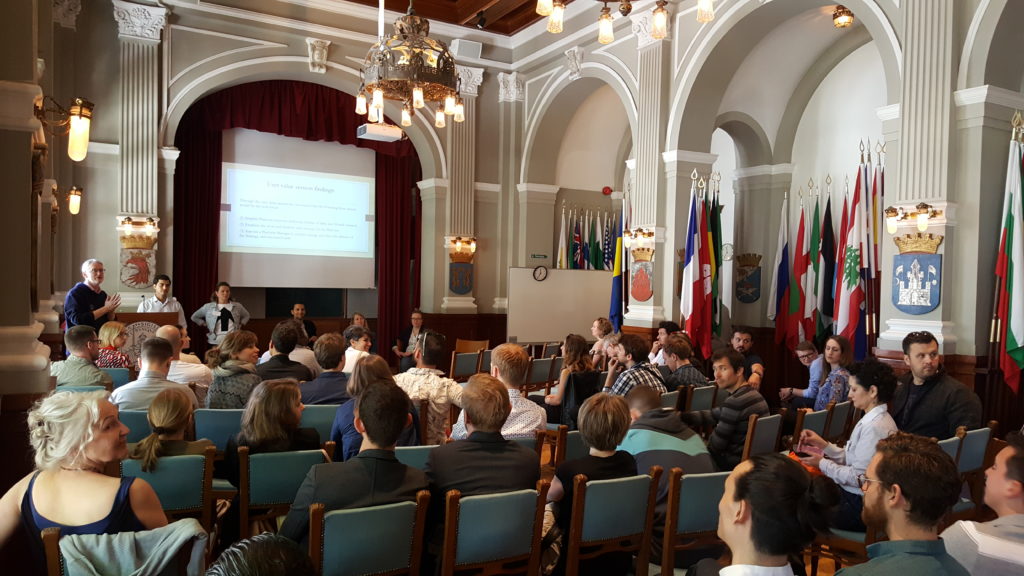
Hélène Robert & Mel Phadtare
The International Institute of Industrial Environmental Economics (IIIEE) of Lund University, Sweden, celebrated a milestone 25-year anniversary as part of its bi-annual alumni conference event held on 23 and 24 May, 2019. As two proud graduates from the IIIEE, now E Co. consultants, we took the opportunity to participate, present, and take note of some of the leading practices, technologies and concepts being developed that tackle some of the most pressing issues around the globe.
About the IIIEE
The vision of the IIIEE is to advance strategies for sustainable solutions through cutting edge interdisciplinary research, high quality innovative education, effective communication and strong partnerships. The Institute’s two Masters programmes, Environmental Management and Policy (EMP) and Environmental Sciences, Policy and Management (MESPOM), are multidisciplinary in nature and have seen 897 graduates take up roles around the world in sectors including waste, energy, corporate social responsibility, transport and water. Equally diverse are the types of organisations alumni are employed by – ranging from government, NGO, UN, regional bodies, social enterprises, institutions, academia, private industries to consulting agencies.
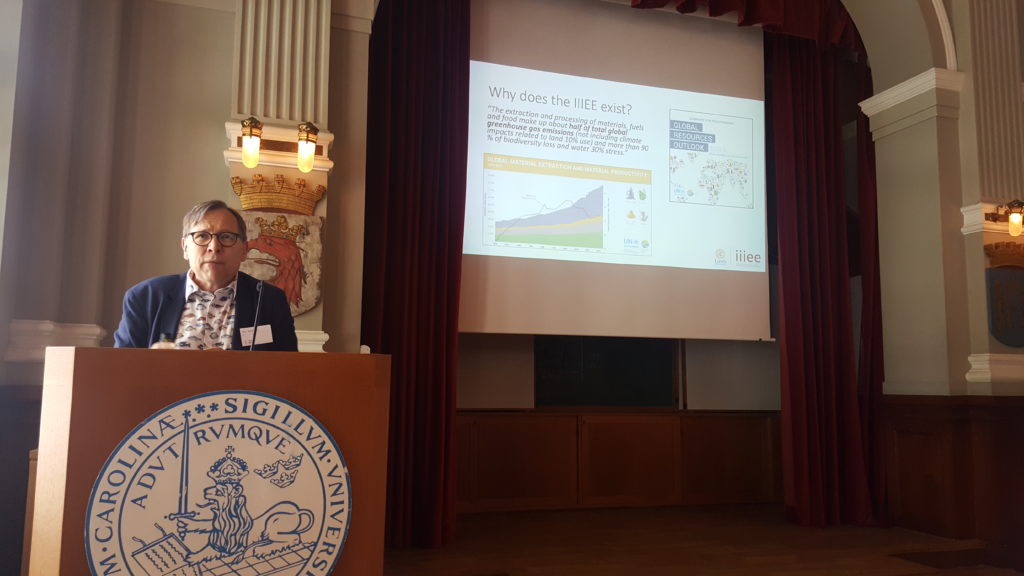
IIIEE Director Mr. Per Mickwitz “The Institute remains as relevant as ever”
The Event
We were part of 150 alumni gathered to dialogue, exchange, network and present along with the IIIEE’s staff of professors, lecturers, PhD students, research assistants and new Director Mr. Per Mickwitz. Notable professors in attendance included: Professor Luis Mundaca, Research Coordinator for International and National Policy Intervention and Lead Author for the IPCC Special Report on Global Warming of 1.5C; and Associate Professor Thomas Lindhquist, acknowledged for introducing the Extended Producer Responsibility (EPR) concept and for working all over the globe to advise on EPR and Circular Economy practice.
Presentations
(See the full list of topics and presenters at the ‘Notes’ section at the end)
There was a good spread of thought-provoking topics – from waste management, sustainable finance and investment, environmental activism, sustainability in healthcare, entrepreneurship, sustainable procurement in Sweden and Asia, automated vehicles, and clean technology. The discussions that took place showcased critical thinking and leading practice.
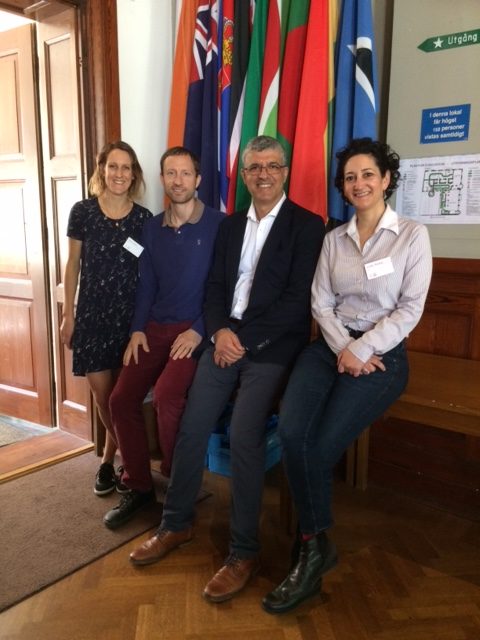
E Co. and friends from OECD and UNIDO take time out to catch up. L-R: Helene Robert, Raphael Jachnik, Tareq Emtairah, Mel Phadtare
E Co. presentation on climate finance
We presented the characteristics of the key multilateral climate funding bodies, including the Nationally Appropriate Mitigation Actions (NAMA) Facility, Adaptation Fund, the Green Climate Fund and the Global Environment Facility (GEF). According to the UNFCCC, the 2016 estimated total flow of global climate finance was between USD 456 and USD 681 billion. We introduced key issues from the ground that consultants working in this field face, such as the requirements by some of these funds to differentiate between development and adaptation. In this podcast by the World Resource Institute, they argue that climate and development should be financed together. During the presentation, audience members raised questions about how the results of the projects implemented under these funding bodies are monitored and about the efficiency and effectiveness of having a number of different funds serving a similar purpose.
Monitoring and evaluation is an important part of these funds. Recently at E Co., we have conducted a number of mid-term reviews of projects funded by the GEF. These reviews are vital to provide key stakeholders (e.g. implementers, donors and others) an overview of what works well and what is not working well. The GEF provide input into what could be modified in terms of project design or management to ensure that the project will reach its objectives. Having multiple funds can understandably be perceived as being inefficient, however, climate change is an issue that impacts a number of different sectors and countries in different ways. Given the climate emergency we are facing it can be argued that we need as many revenue streams to mitigate and adapt to climate change, which is already severely underfunded.
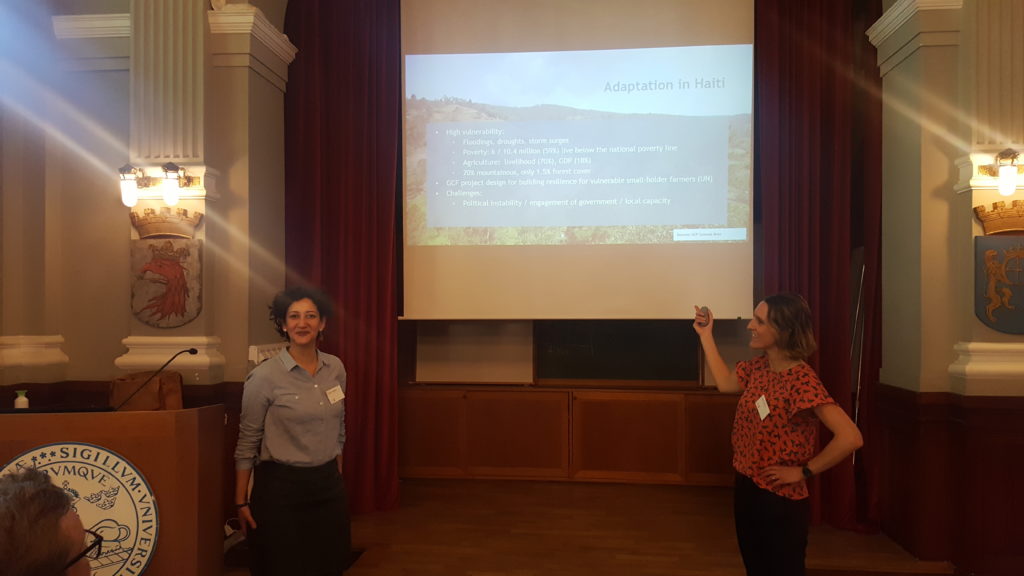
E Co’s climate finance presentation sparked many questions and ‘deeper thinking’
Other insights
Two related finance presentations provided more insight on achieving sustainable outcomes. The first focused on how improved financial literacy is needed to enable people to make more informed decisions about the impact of their purchases and financial savings. This presentation was conducted as a workshop allowing for group discussion on how, in order to secure a fairer and healthier planet, we need to spend and invest responsibly as individuals. In response to this need, another alumni is involved in the development of a platform. This platform aims to empower people, not only to manage their own finances better, but to also understand the implications of their personal financial decisions at a global level. The discussion then shifted to the macro-level, and the organisation called ‘The NEXT ECONOMY’ was presented. This is an organisation that is promoting an economic system that goes beyond capital gain as a measure of success and prioritises the wellbeing of people and the planet. NEXT ECONOMY do this through training, policy and advocacy, and community building. It’s reassuring to see some of these ideas talked about in the room actually happening in the real world.
Last month, New Zealand released its first ‘wellbeing budget’, which goes beyond Gross Domestic Product (GDP) to measure the success of the country and structures the latest budget around Gross National Well Being. The wellbeing budget has a strong focus on improving the health of the people of New Zealand, as well as the health of the environment, by cleaning up waterways (and making the rivers swimmable again) and helping farmers adapt to climate change and reduce emissions. And of course, many of us are familiar with Bhutan’s Gross National Happiness (GNH) index enacted in 2008 as part of the Constitution of Bhutan. The GNH index differs from the GDP in that it measures four pillars, the first of which is sustainable and equitable socio-economic development, thereby bringing together wellbeing, social and economic indicators.
The second finance presentation delved into sustainable finance and investment. According to the panel, progress is being made and more companies are paying attention to disclosing and reporting their emissions. The Task Force on Climate Related Financial Disclosure (TCFD) was set up in 2015 with a view to provide guidance on how companies should report on climate risk. This was in recognition to the very real challenges companies face in fully understanding and applying responsible financial investment. Additionally, the European Union is considering a proposal for a regulation on disclosures relating to sustainable investments and risks, as well as amending a current Directive. While this is promising, the climate emergency is far outpacing such efforts. How can we be sure that when a company reports on their de-risking efforts they understand the extent of their impacts, are genuine in addressing these, and that across the board companies are speaking the same language? Methods are being tested and trialled, but not quickly enough.
The conference supported a series of presentations that focused attention on financial systemic fixes, this is well justified given the finance sector holds huge potential to address pressing climate change and related environmental issues. As consultants within the field of climate finance, we notice major gaps when it comes to understanding the sector. While grants are the traditional development tools for finance, there is a push towards the use of a variety of financial models and instruments to fund climate mitigation and adaptation – from concessional loans, to equity and guarantees. However, there is a lack of understanding of how these mechanisms work, which is a barrier to their utilisation and ambition. In order to make scalable change, we need to leverage different mechanisms of financing to respond to the climate challenges that we are facing today and will continue to face in the future.
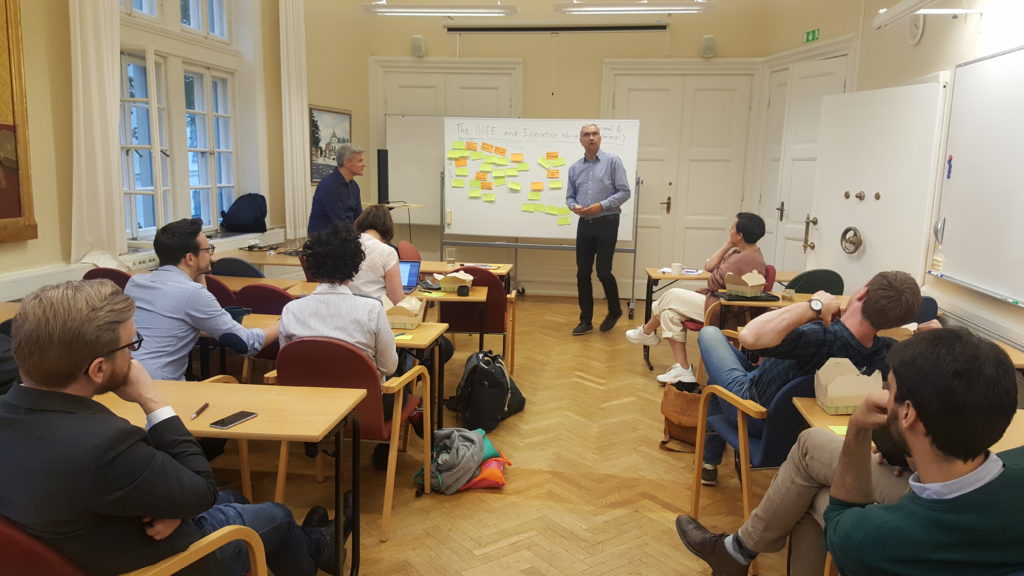
One of the many parallel sessions, this one focused on education and engagement in sustainable change
‘Total Transition’
We attended a virtual presentation on a book called ‘Total Transition’, published by two alumni. The authors, Sandeep Pai (an award-winning journalist) and Savannah Carr-Wilson, brought us along on their journey to visit communities in coal mines in India and a tar sand extraction site in Alberta, Canada. They showed us the extent to which the informal economy is dependent on the extraction of fossil fuels for energy. This presentation highlighted the importance of the energy revolution being a just transition by ensuring that no one is left behind, as we steer away from fossil energy. This is also important in the field of climate finance. For example, mitigation projects designed and supported by climate funds such as the NAMA, need to consider the greater context of the country projects are being implemented in, and implications of promoting this transition.
Take the transport sector: in many parts of the world transport services are run by the informal sector. If a project sets up a new transport system and replaces small diesel vans with e-buses (to reduce CO2 emissions), what happens to those workers whose livelihoods depend on transporting people? While this project would result in reduced emissions, people would be left behind, exacerbating poverty. The transition to cleaner energy can provide a number of opportunities such as new jobs in the renewable energy sector. These opportunities need to be matched with improved and expanded capacity that can take place in the form of trainings and education for those people whose livelihoods are at risk.
Wrap up
The conference was wrapped up with a field trip and dinner at a family-run asparagus farm. We never thought it would be possible to have a 7-course meal of asparagus – which included asparagus soup, risotto, and green asparagus ice cream for dessert. Overall, the conference left us feeling energised and motivated. It was hugely inspiring to see so many committed people working to make the world a more sustainable and liveable place. The conference provided a platform for the three C’s – an opportunity to Connect, encouragement to Collaborate and understanding of the Challenges ahead. Given the extent of this climate emergency challenge, we need all hands-on deck.
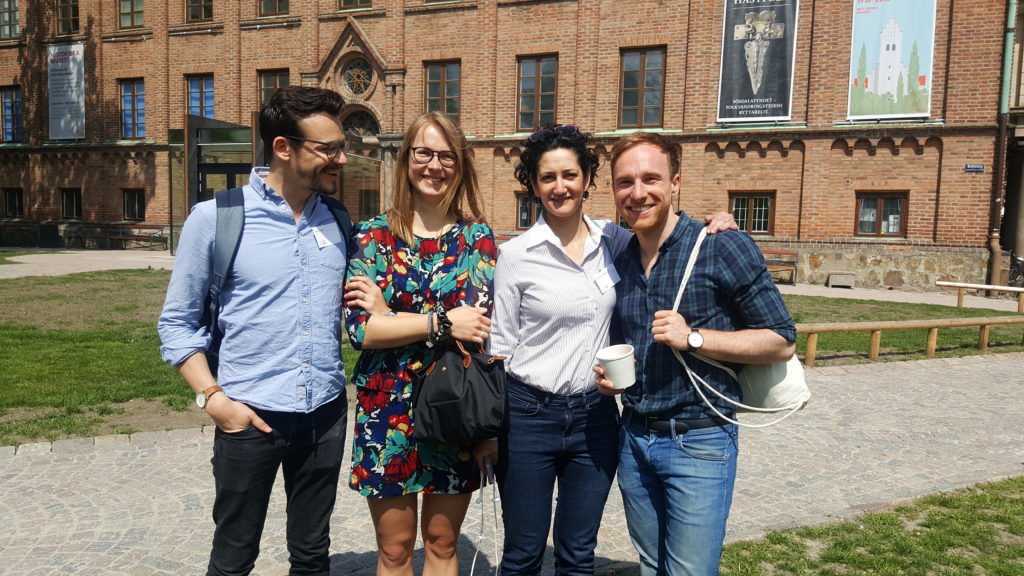
Alumni pals from different countries, courses, and professional sectors talk about the climate emergency on School Strike Friday in Sweden.
Notes
List of Presentations
Advancing Sustainable Finance: Challenges and Solutions, Presenters: Agathe Boli, Hanna Roberts and Sean Martin
Technology and Digital Approaches to Waste Management and Air Pollution, Presenters: Soon Hun Yang from Eco Ideal Consulting and Chaim Kolominskas from Envirosuite
Sustainable Procurement in Asia and Sweden, Presenters: Haiping Yu and Carl Dalhammer
In the Future Cars Will Drive You, Presenter: Ella Rebalski
Total Transition, Presenters: Sandeep and Savannah-Carr
Environmental Activism and the Digital Age, Presenters: Florian Engel and Claire Donner
Big Picture – Building and Economy that Benefits Us All, Presenter: Dann Moreno
Sustainability in Healthcare and Life Sciences, Presenters: Dolores Ohman and Hasselholm Miljo
Entrepreneurs and Start Ups – Principles into Practice, Presenters: Israa Thiab, Julia Gause and Jacob Policzer
CleanTech Showcase, Presenters: Fredrik Westman
Join the conversation by posting a comment below. You can either use your social account, by clicking on the corresponding icons or simply fill in the form below. All comments are moderated.